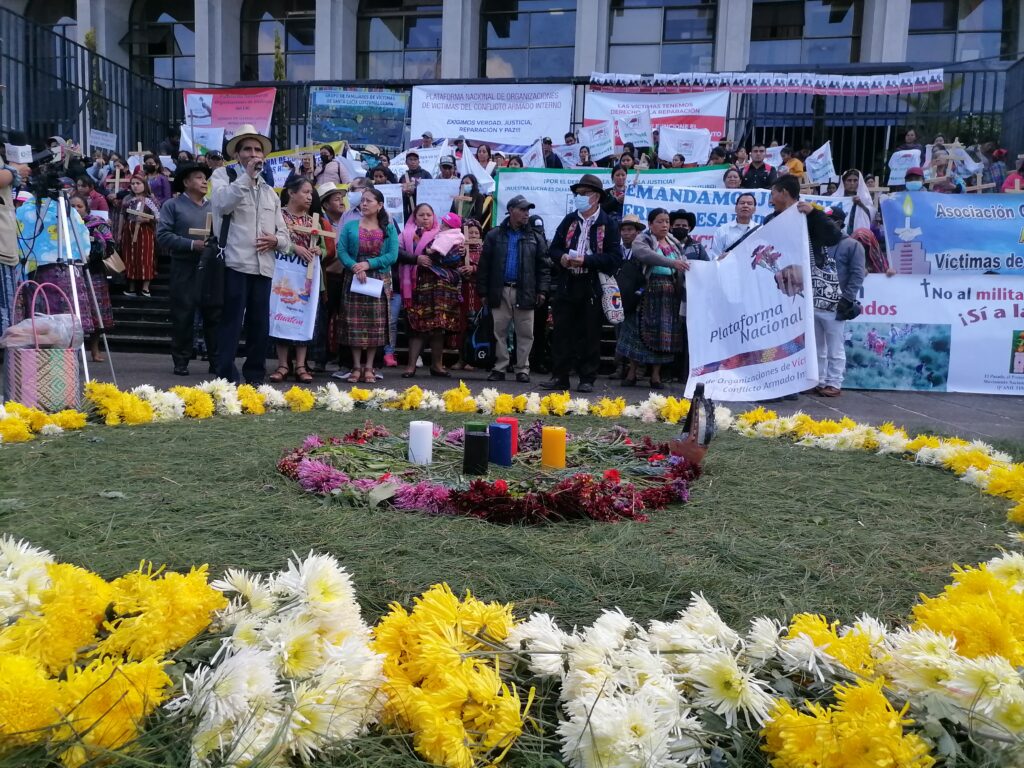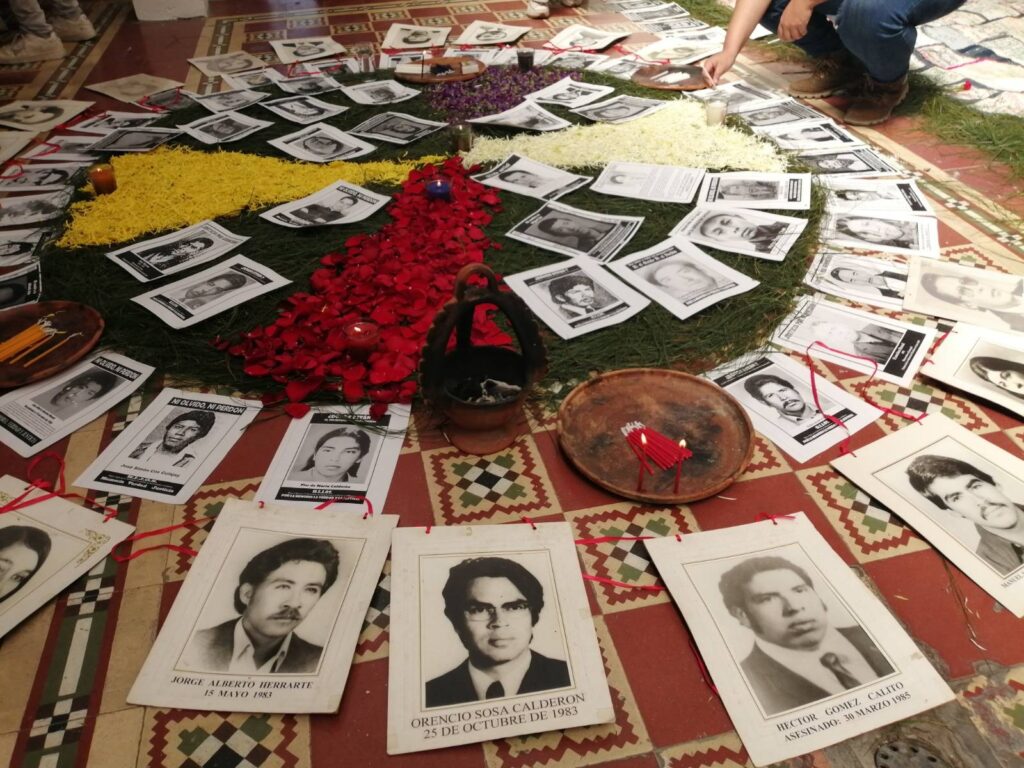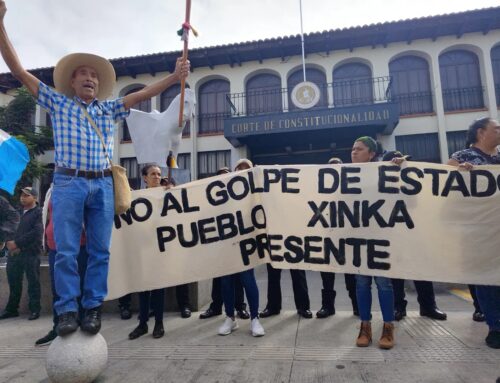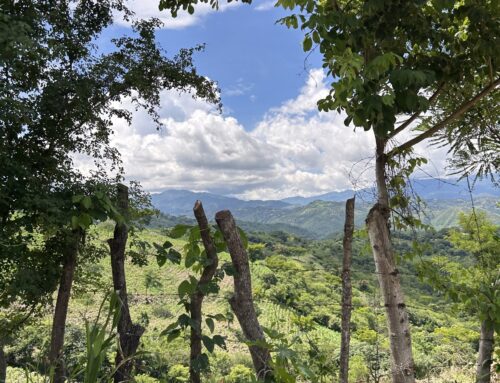Over the past four years, the struggle for justice in Guatemala has endured a series of alarming setbacks that call us to maintain and sustain our solidarity with those we have stood beside for over four decades.
During Giammattei’s presidency, the Pact of the Corrupt and their powerful economic allies have achieved the co-optation of the judicial and legislative branches of the government, resulting in a policy of impunity and severe retaliation against key individuals. Among these are independent judges and prosecutors who have worked in cases related to political corruption, organized crime, and crimes of the past, and the retaliation has forced many into exile.
Updates on cases we accompany

| Survivors and families of cases of Genocide during the Internal Armed Conflict (CAI in spanish acronyms) in Guatemala gather at the Human Rights Plaza in Guatemala City to commemorate the National Day for the Dignification of Victims of the CAI this February 25th, 2023, with ceremonies and statements demanding justice and truth for the victims of Genocide. |
| Photo by NISGUA |
- Military Diary Case
After Judge Miguel Angel Galvez suffered threats and persecution for opening the trial of the former military and police men accused of crimes against humanity, he was forced to resign and fled into exile. He was replaced by a new Judge, Claudette Dominguez, who ruled to release Toribio Acevedo Ramírez, and put him on house arrest. Acevedo Ramírez was arrested last May in Panama, as he apparently attempted to flee to Europe. Before his arrest, he worked as chief of security with Cementos Progreso, and was a member of the Presidential High Command between 1982 and 1986, when the disappearances and assassinations recorded in the Military Diary took place.
Furthermore, On February 2, Judge Rudy Bautista ruled to release another two suspects, Malfred Orlando Pérez Lorenzo and Coronel Jacobo Esdras Salán Sánchez to house arrest. All of these substitute measures were granted despite the fact that house arrest is not an option the law recognizes in cases of murder or forced disappearance, as human rights groups have pointed out.
These actions represent a security risk for witnesses, survivors, relatives, plaintiffs and lawyers in this case. We invite you to read the statement that the families gave after the hearing.

| Photographs of people who disappeared during the Internal Armed Conflict (CAI in Spanish acronyms) in Guatemala accompany the ceremonial altar at the National Day for the Dignification of Victims of the CAI on February 25, 2023. |
| Photo by NISGUA |
- Ixil Genocide Case – Lucas Garcia
Another case where we see troubling trends is the Ixil genocide case from the period under Romeo Lucas García (1978-1982). After 3 years of waiting, the opening of the debate to determine the criminal responsibility of Benedicto Lucas Garcia and Manuel Callejas y Callejas for the crimes of genocide, forced disappearance, and crimes against humanity for the military operations deployed in the Maya Ixil region was originally scheduled for January 9.
In this case, the defense has also presented measures in favor of Lucas García and Callejas y Callejas, pushing for their release to house arrest. However, the hearing was suspended due to a challenge filed by the AJR’s legal team to replace Judge Andrea Julieta Lobos, due to conflicts of interest given that she is a relative of former military personnel who were part of the combat units in the Quiché Military Zone in the 1970s.
![nb25 [ENG] Photo of a red and white protest sign that reads "Never Again, Rivers of blood in Guatemala" behind a wall that is the entrance of a church. [ESP] Fotografía de una manta dolor rojo que en blanco dice "Nunca más rios de sangre en Guatemala" en la puerta de entrada a una iglesia](https://nisgua.org/wp-content/uploads/nb25-1024x768.jpeg)
| Photo of the statement of survivors and families of the Genocide in the Internal Armed Conflict in Guatemala during the commemoration of February 25, 2023 in Nebaj. |
| Photo by NISGUA |
As NISGUA we are concerned about the obstruction of access to justice for victims, through delaying tactics such as appointing judges with conflicts of interest. We have concerns about the safety of the witnesses and survivors in this case as well, since the justice system’s signaling in favor of the accused military personnel leaves the survivors exposed. Many survivors are of very advanced age and have health concerns, which means they may not be able to testify or may pass away before they are able to testify. This would evidence a serious lack of access to justice for them, their families and their communities.
Despite the difficult context of the path toward justice in Guatemala, our partners remain committed to their struggle, and more than ever international solidarity is key to let our partners know that they are not alone.





Leave A Comment